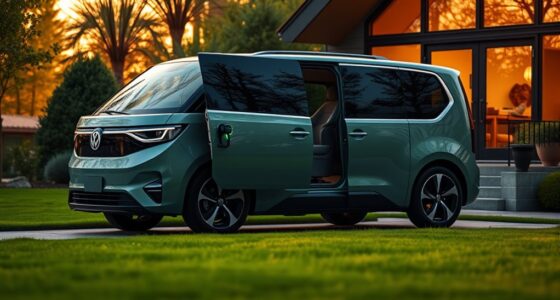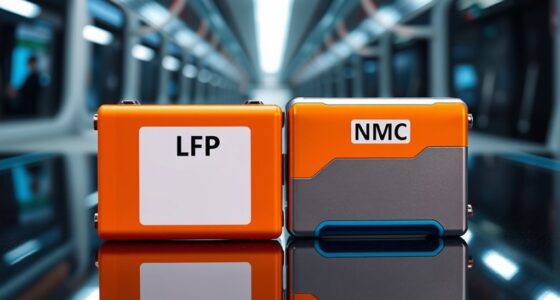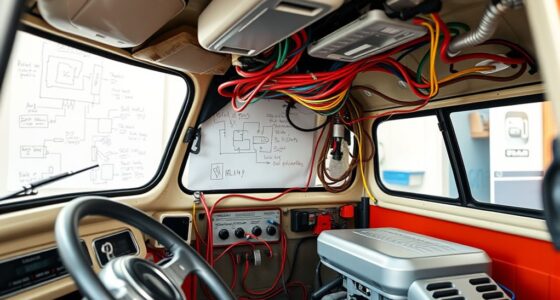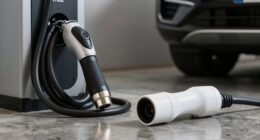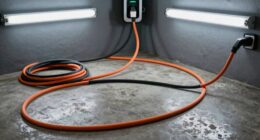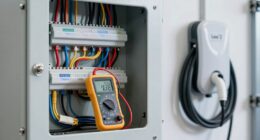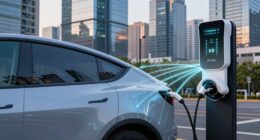Understanding your classic VW Bus engine specs helps you grasp its performance potential. Horsepower measures how fast your bus can accelerate and reach top speeds, while torque indicates the twisting force that aids hauling and hill climbing. Both are key to knowing what your engine can do and how upgrades might boost performance. If you want to learn how these specs influence restoration and modifications, keep exploring to uncover more details.
Key Takeaways
- Horsepower measures the engine’s ability to accelerate and reach top speed, indicating overall performance.
- Torque reflects the twisting force that determines the VW Bus’s hauling capacity and hill-climbing ability.
- Both horsepower and torque are essential for understanding how the vehicle performs under different driving conditions.
- Upgrading engine parts can increase horsepower and torque, improving acceleration and driving experience.
- Balancing power gains with vehicle durability and handling is crucial when modifying or restoring the VW Bus engine.

The VW Bus, an iconic symbol of the 1960s and 70s, is known for its simple yet reliable engine design. When you’re considering restoring or customizing your vintage bus, understanding its engine specs becomes essential. Knowing how horsepower and torque work helps you gauge performance and decide whether to stick with original parts or explore engine modifications. Restoration tips often focus on preserving authenticity, but upgrading certain components can enhance driving experience without sacrificing that classic charm. For example, reconditioning the existing engine or fitting a rebuilt carburetor can boost reliability and efficiency. If you’re interested in more substantial improvements, engine modifications like installing a larger displacement engine or upgrading the cooling system can greatly increase power and durability. Just remember, these changes can impact fuel consumption and emissions, so weigh your goals carefully.
The core engine specs—horsepower and torque—define how your VW Bus performs on the road. Horsepower measures how quickly your bus can accelerate and maintain higher speeds, while torque indicates how much twisting force is available, especially useful for hauling loads or climbing hills. When you restore your bus, keeping these specs in mind helps you decide whether to keep the original engine or pursue modifications. For instance, many enthusiasts opt for engine swaps or performance upgrades to improve acceleration or cruising ability. These engine modifications often involve replacing the stock engine with a rebuilt or larger one, adding carburetor kits, or installing aftermarket exhaust systems. Such updates can elevate horsepower and torque, making your vintage bus feel more lively and responsive. Additionally, understanding the engine design can assist you in choosing compatible parts and ensuring proper fitment.
However, it’s vital to understand that increasing horsepower or torque isn’t just about raw numbers; it influences how your VW Bus handles daily driving. More power means potentially more stress on the drivetrain and other components, so upgrading the engine should go hand in hand with reinforcing the transmission and cooling system. When you’re restoring your bus, pay attention to engine specs to match your driving style and goals. If you want a reliable cruiser, sticking close to stock specs and focusing on restoration tips for maintenance may suffice. But if you’re after a more spirited ride, exploring engine modifications for increased horsepower and torque can make a noticeable difference. Just guarantee you balance performance upgrades with the bus’s overall integrity, and always choose quality parts to keep your vintage VW running smoothly for years to come.
Frequently Asked Questions
How Does Engine Size Affect Fuel Efficiency in VW Buses?
When considering how engine size affects fuel efficiency in VW buses, larger engine capacity usually means lower fuel economy because bigger engines consume more fuel to produce power. You’ll notice that smaller engines are more efficient, especially during city driving or on long trips. So, if you want better fuel economy, opting for a bus with a smaller engine can help save you money on fuel costs over time.
What Are the Common Engine Problems in Classic VW Buses?
Many believe classic VW buses are trouble-free, but they often face common engine problems. You might experience engine overheating, especially if cooling systems aren’t maintained properly. Carburetor issues are also frequent, causing poor performance or starting troubles. Regular inspections and maintenance help prevent these issues. Trusting this, you can keep your bus running smoothly by addressing overheating concerns early and tuning the carburetor as needed.
Can I Upgrade My VW Bus Engine for Better Performance?
You can definitely upgrade your VW Bus engine for better performance. An engine swap is a popular performance upgrade, allowing you to install a more powerful or modern engine. This not only boosts horsepower and torque but also improves fuel efficiency and reliability. Just make sure to select the right engine compatible with your bus and consider professional installation to ensure everything runs smoothly and safely.
How Do Emissions Standards Impact Vintage VW Bus Engines?
Imagine cruising your vintage VW bus, only to find emissions regulations suddenly limiting your drive. Emissions standards heavily impact your vintage engine modifications, often requiring upgrades to meet legal limits. These regulations aim to reduce pollution but can restrict performance upgrades. You might feel frustrated, but understanding the rules helps you balance preserving your classic’s charm while staying compliant. Staying informed guarantees your vintage VW remains a joy to drive within legal boundaries.
What Maintenance Is Essential for Preserving Engine Health?
To keep your vintage VW Bus engine healthy, you should prioritize regular maintenance. Make sure you perform oil changes on schedule to prevent engine wear. Additionally, check and replace spark plugs as needed to guarantee smooth combustion and peak performance. Staying consistent with these tasks helps prevent costly repairs and keeps your engine running reliably, so you can enjoy your classic bus for years to come.
Conclusion
So, next time you marvel at that vintage VW Bus chugging along, remember its humble engine specs. Sure, it might not win races, but there’s something charming about its simplicity and character. Ironically, while today’s engines boast mind-blowing horsepower, your classic VW’s modest torque and horsepower remind us that sometimes, it’s not about speed—it’s about the stories those engines tell. So enjoy the ride, slow and steady, because that’s where the real magic happens.


